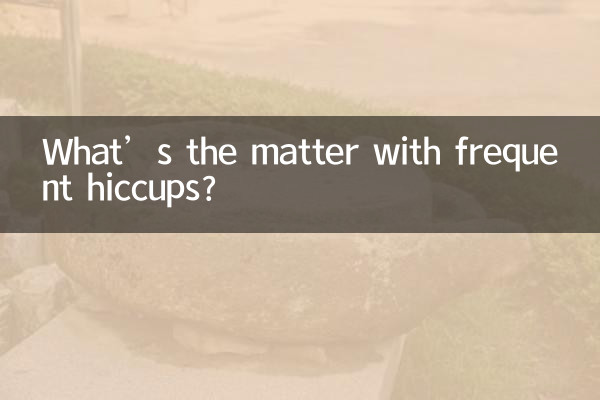What's the matter with frequent hiccups?
Hiccups (hiccups) are a common physiological phenomenon, but frequent or persistent hiccups can be bothersome or even disruptive to your life. This article will combine the hot topics and hot content on the Internet in the past 10 days to provide you with a detailed analysis of the mystery of hiccups from the causes, classifications, mitigation methods and precautions.
1. Common causes of hiccups

Hiccups are mainly caused by diaphragm spasms. The following are common triggers:
| type | specific reasons | Popular discussion keywords |
|---|---|---|
| Physiological | Eating too fast, overeating, carbonated drinks, spicy food | #milkteaburp#, #热pot后burp# |
| pathological | Gastroesophageal reflux, central nervous system diseases, metabolic abnormalities | #久burpvigilance#, #burpandcancer# |
| other | Emotional stress, sudden temperature changes, alcohol stimulation | #NERCHIBUCCING#, #DRINKING BUCCUP# |
2. Classification and duration of hiccups
Depending on their duration, hiccups can be divided into three categories:
| type | duration | Suggested handling |
|---|---|---|
| Transience | <48 hours | Home Mitigation Measures |
| Continuity | 48 hours-1 month | Medical examination |
| stubbornness | >1 month | professional treatment |
3. Methods to relieve hiccups that are hotly discussed on the Internet
The 5 most popular relief methods on social media in the past 10 days:
| method | principle | Popular index |
|---|---|---|
| Breath-holding method | Increase blood CO2 concentration | ★★★★☆ |
| scare method | stimulate vagus nerve | ★★★☆☆ |
| Drinking water bending method | Change diaphragm position | ★★★★★ |
| sugar therapy | Stimulate pharyngeal nerves | ★★★☆☆ |
| Press acupoints | Neiguan point/Cuanzhu point | ★★★★☆ |
4. Situations that require vigilance
The following situations may indicate serious illness and require prompt medical treatment:
1. Stubborn hiccups that last for more than 48 hours
2. Accompanied by vomiting, chest pain, and weight loss
3. Affect eating or sleeping
4. Have neurological symptoms (such as dizziness, blurred vision)
5. Recent surgery or trauma history
5. Lifestyle suggestions to prevent hiccups
1.Diet modification:Chew slowly, avoid overeating, and drink less carbonated drinks
2.Emotional management:Relieve stress and avoid excessive tension
3.Habit improvement:Stop smoking, limit alcohol consumption, and take appropriate activities after meals
4.Keep warm:Avoid getting cold in the abdomen
6. Latest research trends
According to recent medical journal reports:
- The vagus nerve stimulator is 70% effective in treating stubborn hiccups
- Certain anti-epileptic drugs are effective for certain types of hiccups
- Acupuncture treatment shows potential in clinical trials
Summary: Most hiccups are nothing to worry about, but those that persist should be taken seriously. By understanding the cause and mastering the correct mitigation methods, you can effectively deal with this common annoyance.

check the details

check the details